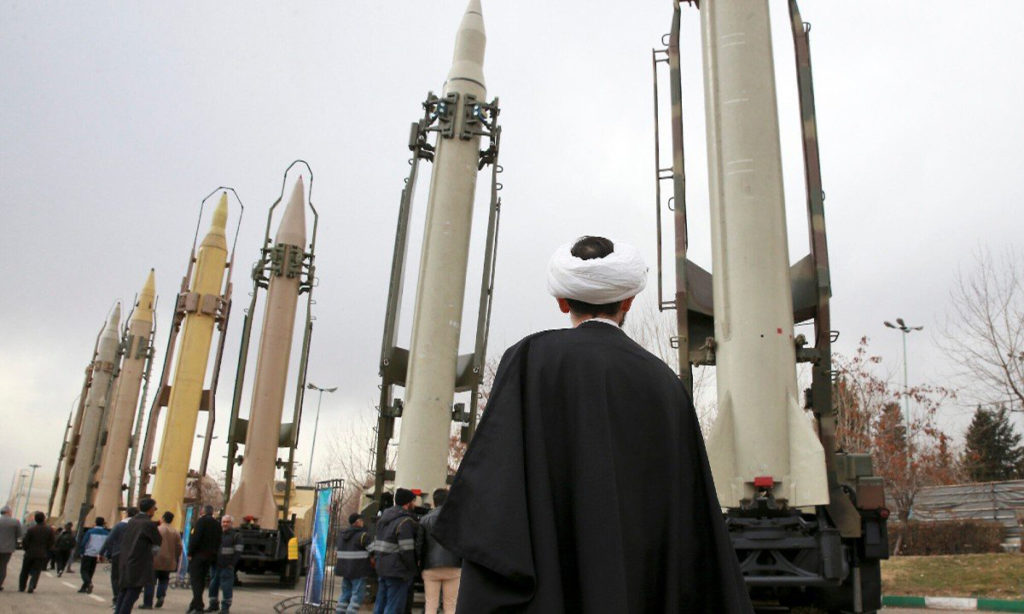Australia/Israel Review
Has the Iranian arms embargo expired?
Oct 29, 2020 | Jackson Richman

Despite ongoing fears of Iran’s pursuit of nuclear weapons and aggression in the Middle East, the UN arms embargo on Teheran was scheduled to have expired on Oct. 18, allowing the Islamic Republic to purchase missiles and other armaments from other countries.
“Thanks to the nation’s resistance and our diplomats’ efforts, and despite America’s push in the past four years, this unjust embargo is to be lifted,” said Iranian President Hassan Rouhani on Oct. 14. “As of Sunday, we can purchase or sell arms from and to anyone we desire.”
Yet the ostensible expiration came after the United States enacted UN snapback sanctions on the regime in August, a move that included extending the arms embargo indefinitely.
It remains unclear, therefore, if the arms embargo is technically and legally lifted, or if Iran is now able to purchase advanced weapons.
Richard Goldberg, the former director for countering Iran’s weapons of mass destruction at the White House National Security Council, told JNS that “US policy officially recognises that a snapback of UN sanctions took place and, as such, the arms embargo [did] not expire on October 18th.”
Goldberg, now a senior adviser at the Foundation for Defence of Democracies, cited US President Donald Trump’s executive order in September that allows the United States to sanction anyone who sells arms to Iran in violation of the arms embargo.
“Americans should join together on a bipartisan basis to support the enforcement of these sanctions to prevent arms transfers in violation of UN Security Council Resolution 1929, which America believes is back in force,” said Goldberg, citing the 2010 UN embargo on arms to Iran.
The US activated the mechanism in August to enact the snapback sanctions under UN Security Council Resolution 2231, which endorsed the 2015 JCPOA Iran nuclear deal and lifted six Security Council resolutions sanctioning Iran.
The US withdrew in May 2018 from the nuclear deal, reimposing sanctions lifted under it and enacting new penalties against Iran as part of what the Trump Administration has called a “maximum pressure” campaign.
The move to enact snapback, which took effect last month, came after the UN Security Council failed to pass a resolution in August to indefinitely extend the arms embargo on Iran.
The American Jewish Committee (AJC) had expressed alarm, saying that Oct. 18 would be “a profoundly sad and dangerous day for global security.”
“Thanks to UN Security Council inaction, Iran will be free to legally buy and sell conventional weapons without violating the JCPOA (2015 Iranian nuclear deal) or UN restrictions,” said AJC CEO David Harris in a statement. “No doubt, Iran’s neighbours and countries far beyond the Middle East will suffer the consequences of the Security Council’s abject failure to call out the true nature of the regime in Tehran and contain it.”
“China and Russia now are very happy. These two countries have no hesitation or compunction about openly selling weapons to Iran,” said Harris, adding that “North Korea, Venezuela and Turkey are similarly gleeful.”
“The tragic reality is Iran today, despite major economic challenges, is more dangerous than ever as a regional and global actor,” he continued. “Iran’s tentacles are firmly in Iraq, in Syria, in Lebanon and in Gaza, trying to get into the West Bank, and either directly or through its terrorist proxy, Hezbollah, are very active in Africa, in Europe, in Asia, in Latin America and continually attempting in the United States.”
United Against Nuclear Iran policy director Jason Brodsky told JNS that while America considers the arms embargo in effect still, China and Russia will likely look to sell Iran arms.
“The United States argues snapback has already happened, and plans to act as if the arms embargo will remain in effect,” he said.
He said that France, Germany, the United Kingdom, Russia and China “appear irresponsibly complacent with [the] sunset [clauses in the JCPOA] and refuse to recognise Washington’s snapback. Russia and China want to preserve their ability to sell arms to Iran.”
Brodsky noted that Russia’s ambassador to Iran, Levan Dzhagaryan, “proclaimed that Moscow would consider selling Iran its S-400 [anti-aircraft] missile defence system after Oct. 18,” and that Iranian Defence Minister Amir Hatami “visited Russia this summer, and was briefed on the S-400 during his visit to a military expo.” Therefore, “this is cause for concern.”
Brodsky added that France, Germany and the United Kingdom have “prioritised a nuclear deal, which is already on life support, over pleas from Arabs and Israelis alike to extend the arms embargo on Iran. In doing so, it is endangering international peace and security.”
He noted that the European Union “has its own arms embargo on Iran, which expires in 2023.”
Brodsky said that after Sunday, the United States will have the major “burden of enforcement” of the UN arms embargo.






